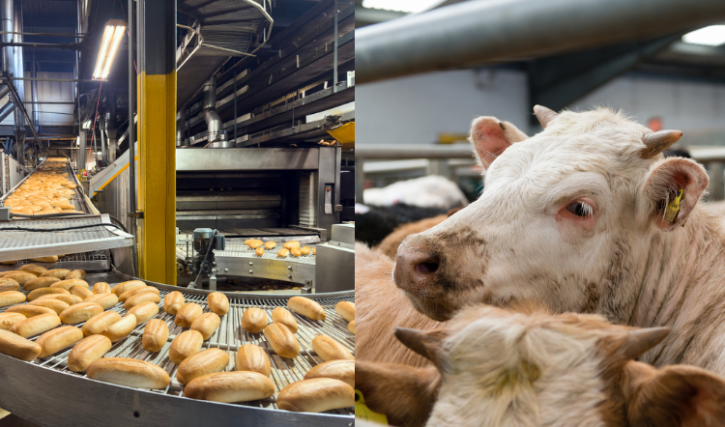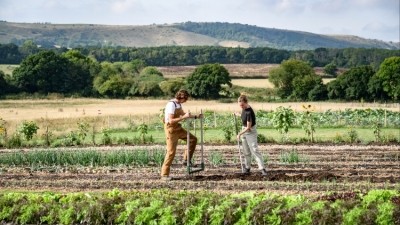News
Cross party group calls food security to be heart of Labour’s industrial strategy

The report, ‘Strengthening the UK’s Food Security: Innovation and investment in the Food Manufacturing Sector’, claimed previous food security initiatives have focused too narrowly on agriculture.
While farming remained vital to UK food, it argued a strategy that encompassed the whole food ecosystem – including food manufacturing, logistics and retail – was essential to keep products on shelves and prices down.
Policy Exchange rejected the position that the UK should be self-sufficient in food production, which it dubbed an unrealistic aim that would be both unachievable and counterproductive.
It argued food security could be enhanced through a flexible, agile and robust trading ecosystem, with robust supply chains – and a reorientation of the UK’s international aid spending to support global food security.
Recommendations for government
The report made 27 recommendations for Government across several areas, including investment, innovation, regulation, and international trade.
Top of the list were calls for the development of a National Food Security Strategy that encompasses the entire food ecosystem, overseen by a cabinet committee or mistrial working group.
This goes the same for government programmes, policies and funding opportunities aimed at enhancing food security – the system is currently narrowly focused on agriculture.
Recommendations were also made for the Food Standards Agency to fast-track approvals of any product that has already been approved by trusted regulatory regimes in countries outside of the UK.
Commenting on the report, former shadow minister for public health and former vice chair of the Food and Drink APPG Sharon Hodgson said: “Food security is one of the major challenges policymakers currently face, and the most vulnerable in our society are those who suffer the most.
“I particularly welcome the focus on innovation to combat food waste, something which I have frequently championed and supported – The Company Shop Group in my constituency is a brilliant example of this innovation at a local level. I urge the Government to carefully take note of the important recommendations contained within this paper.”
Manufacturing a priority
Other recommendations focused on explicitly including food and drink manufacturing as a priority sector in future industrial and agri-tech strategies, as well as broadening the scope of the UKRI’s Transforming Food Production challenge to become Transforming Food Security.
George Weston, chair of Associated British Foods, said: “This report from Policy Exchange highlights the vital importance of food manufacturing to both food security and the UK economy and the key role that the sector plays in ensuring that our food is safe, nutritious and affordable.
“Associated British Foods believes that a pro-growth environment needs to be fostered thereby enabling the UK’s food and farming sector to decarbonise while simultaneously stimulating UK growth and investment, jobs and exports.”
The report comes as the industry reported a 30% drop in investment since 2019, despite an estimated industry turnover of £142bn – as well as providing exports of more than £24bn. For comparison, investment into overall UK manufacturing – excluding food and drink – rose by 5% over the same period.
Strengthening UK food security
Former chair and chief executive of Nestle UK and Ireland Dame Fiona Kendrick added: “Strengthening UK food security must be a national economic priority along with defence and energy security. Against the backdrop of increased geo-political instability and climate change, we cannot assume that our food system will always withstand shocks.
“The UK Government should take forward these specific recommendations, including the development of a National Food Security Strategy, in collaboration with the entire food value chain to deliver a more secure and resilient food system that invests for the future.”
Karen Betts, Food and Drink Federation chief executive, welcomed the report and focus placed on putting food and drink at the heart of Whitehall policymaking.
“The UK has a highly sophisticated food system, which supports everyone’s daily lives by providing a wide range of affordable, safe and nutritious food and drink. But we must not take it for granted,” said Betts.
“Challenges lie ahead which need investment if our food system is to remain secure – from the innovation needed to tackle climate change, raise productivity, and invest in new products, to keeping prices fair for suppliers and consumers, and ensuring the UK strikes the right balance between domestic production and trade.
“Taking the right policy decisions now, weighed across Whitehall departments and as recommended by Policy Exchange, will lay the foundations for UK food security into the future.”
Meanwhile, the decision to bring forward plans for a Deposit Return Scheme (DRS) in the UK will lift the country’s waste management sector and accelerate the move to a low-waste circular economy, according to waste management software provider ISB Global.















